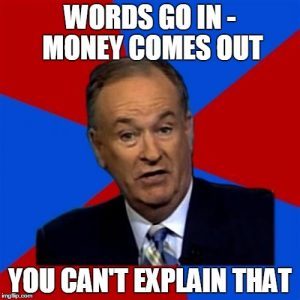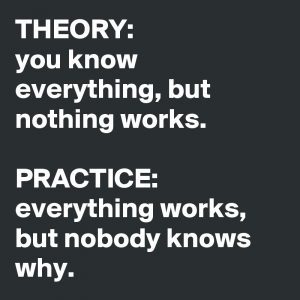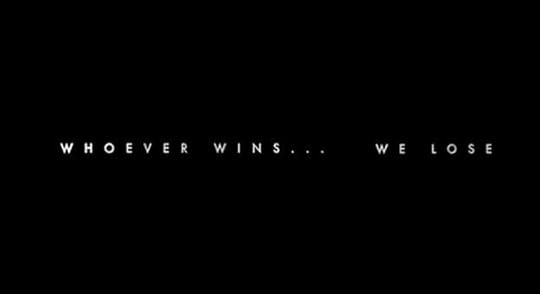Professional Storytelling: Getting Paid – Part One
When authors and publishers fight, nobody wins.
I read this this nasty exchange between Nick Mamatas and The Offing Magazine a couple of weeks ago. It reminded me of the bitter discussions I’ve had between other publishers, promoters, social media experts and magazines in my pursuit of artistic excellence. Making the transition from amateur to professional is difficult in any business, but it seems getting paid for written work is weirder than most.
“How do I get money for this?” is the question on every author’s mind.
I wrote a poem, could I get paid for it?
I wrote a short story, how do I sell it?
I wrote a novel, how do I find a book agent?
 We’re all traveling the same path of ‘pay me for my art.’ To my mind, nothing is more soul-killing to a creative person than that awkward moment when they screw their face up at you and go “You … you expect me to pay for this?” Meanwhile, Bill O’Reilly ghostwrites another non-fiction book about why you’re an idiot and it’s a New York Times’ Best Seller before the month is out.
We’re all traveling the same path of ‘pay me for my art.’ To my mind, nothing is more soul-killing to a creative person than that awkward moment when they screw their face up at you and go “You … you expect me to pay for this?” Meanwhile, Bill O’Reilly ghostwrites another non-fiction book about why you’re an idiot and it’s a New York Times’ Best Seller before the month is out.
People ask why we drink.
A few time-worn truths have manifested themselves to me after years of work. If you’re going to write stories for a living, you better understand how to get paid for your work. This blog post is about some of the things I learned about getting paid to write. It’ll help you avoid getting screwed and avoid screwing yourself.
When I wrote Flotilla and published it via Createspace, I started learning a few things. I wanted to understand what would make people want to buy my book, so it was necessary to understand what made people buy any book. What would make them buy Flotilla? How could I get paid for my work? Everything was trial-and-error. Along the way, I was introduced to many, many snake-oil salesmen who make their living out doing one simple thing: Bilking authors out of ‘service fees’ for book promotion. Pay me to Tweet about your book! Pay me to take your book to the Berlin Book Fair! Pay me to build a marketing program for you!
It quickly became apparent that I could easily throw a hundred thousand dollars at this problem with nothing to show for it. I became enraged – like Nick Mamatas did above – at everyone who suggested I work with them for ‘exposure’ or that couldn’t explain how they would provide a return on the investment they wanted me to make. I’m a talented author! I deserve money for my work! It led to some awkward arguments. In the end, no one was convinced and everyone left the table hating each other.
That doesn’t work, either.
In the end, I came to a simple conclusion: Nobody really knows how this all works. I’ve had famous (yes, that guy you’re thinking of and yes, that guy, too) ask me about how to successfully promote new stories. Without a publishing house to manage the process, without a huge marketing budget, we’re all suspicious natives rubbing sticks together, hoping fire comes out.
 How does Twitter work? How do you do a book launch? There are a ton of author forums and subreddits, but there has yet to be a magical ‘one size fits all’ solution to writing and selling a perfect novel.
How does Twitter work? How do you do a book launch? There are a ton of author forums and subreddits, but there has yet to be a magical ‘one size fits all’ solution to writing and selling a perfect novel.
Professional publishers are struggling with this as well. I was talking with a friend who used to work in the publishing business and he told me a vital truth. I’ll protect his identity for reasons that will shortly become clear.
“Books become big because editors decide to get behind them,” he told me over breakfast. “I know (so-and-so), who originally published Bret Easton Ellis. Even though most people think Ellis’ work is horrible, he decided that it was important and published it. It’s the same with many genres, chick-lit, LGBT-lit … they all exist because an established editor or influential publisher decided to throw their weight behind them.”
“So they’re the gatekeepers,” I said.
“Bingo.”
Not a startling revelation, perhaps, but it goes to show that it isn’t just about being a talented writer. The cliche of an underknown author writing something so beautiful that the world of its own volition propels them into the stratosphere is just that: a cliche. Nobody discovers anything. Writing is a hard buck. As it ever has been, according to Ben Bova. ‘Writing the best book you can and people will find it’ is one of the worst pieces of book-business advice an author can hear. It doesn’t work that way. I wish that it did, and so do many other authors, but that’s not the landscape of publishing in 2016.
So yeah, let’s talk about getting paid as a writer. Let’s tear this thing open like an old engine, find out how the parts work and then put it back together so it runs for us. This isn’t going to be a single blog post, either. The topic is *much* too broad. Instead, I’m going to break this up into a multi-parter. Here are some of the bullet points I plan to cover:
Get the Audience First
Ask Questions Up Front …
… But Don’t Pick Fights
Live to Fight Another Day
Look, I get it. Selling your creativity for money is a comically arbitrary, dehumanizing process. Don’t get sucked into the madness. Laugh about it, save it for a funny story at a Con. Whatever you do, don’t let it embitter you. Don’t post an angry diatribe about it, the odds of it making things better for you are worse than successfully navigating an asteroid field in the Millennium Falcon.
I’m closing on a thousand words for this blog post, so let me wrap it up by saying “let’s discover the answers together.” That’s all we really can do. I hate snotty blog posts that reduce complex topics down to glib platitudes. This won’t be that kind of discussion. I wish the answer was easier, but until then, I have a novel to write.




